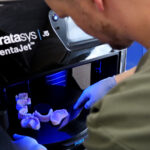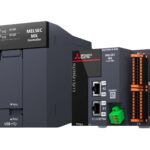SolutionsPT joins partner IFS Ultimp for a discussion about the role of EAM software

that will affect every member of an industrial enterprise.
By Fayez Fares, APM Technical Lead, SolutionsPT
Enterprise Asset Management (EAM) software plays an important role in the
modern industrial facility. It enables businesses to plan, optimise, and execute
necessary maintenance activities in a safe, timely and efficient way. The power of
EAM reaches beyond just maintenance managers. EAM encapsulates multiple
crucial factors for a successful industrial enterprise – factors like skills and
workforce optimisation – while building the foundation to unlock even more
digital transformation benefits, now and into the future. I sat down with
SolutionsPT partner IFS Ultimo, experts in EAM and responsible for optimising
the productivity of over 2,200 customers across the world, to discuss how the
role of EAM has changed and how it benefits each integral human operator.
Patrick Beekman, Partner Solution Manager, IFS Ultimo, said:
“Enterprise Asset Management software plays a key role throughout industrial
operations, not just a single part of it. We want to dispel the myth that the information
provided by EAM is only relevant for maintenance managers. The effects of a
successful EAM deployment reach into every operator’s ability to complete their job role
effectively, and, with the right selection, integrates seamlessly into other technology to
open future capabilities of digital transformation pathways.” Closing the loop
Maintenance is the key factor for many business’ motivation for seeking an EAM
solution, whether they are trying to reduce overall time and cost spent on maintenance
or pre-emptively solve issues before they develop into unplanned downtime, EAM
creates the pathway to achieving ‘just right’ maintenance. The impact of too little
maintenance is obvious – assets breaking down more frequently and reducing overall
productivity or output.
It is also poor optimisation to have expert operators spending their valuable time
constantly fighting fires rather than using their skills for value-adding activities.
Conversely. the same can be said for companies doing too much maintenance,
periodically changing parts in a time-based approach, using estimated wear-and-tear
figures, that may be reducing the potential operating life of parts and incurring
unnecessary costs for replacements, planned downtime and maintenance professionals
time. EAM enables operators to understand each asset’s specific maintenance needs
based on its actual usage, condition and performance, and with that insight deploy
maintenance when it is needed.
Patrick adds:
“What Fayez is describing is the spectrum of maintenance approaches. On one side
you have too little: these are businesses that are constantly in firefighting mode
responding to issues as they happen. On the other side you have businesses that
overestimate how much maintenance they need and as a result are inefficient in their
workforce deployment. This is very common when commissioning large new assets
where customers are trying to satisfy warranty periods. So, you have businesses trying
very hard to avoid unplanned downtime and indirectly creating more planned downtime
with an over-maintenance approach. EAM improves on either side of this spectrum to
push customers to the most beneficial middle.”
“The right EAM deployment should always aim to close the loop between operations
and maintenance. Taking data and transforming it into actionable work orders
automatically to bring those two teams together to make a real collaborative difference.
Both operations and maintenance have access to the asset information they need to
complete their job role effectively and ensure ongoing operations. The automatic
software approach means that any of this vital information isn’t lost in conversations or
between information silos, making all the insight available on the plant floor for decision
makers.”
Patrick’s point around collaboration through EAM can go either further when using that
data to shift a level of maintenance activities to the operator role. Operators are
engaged with key information and tasks around routine inspections, checks, or basic
maintenance can be completed without specialised engineers. This moves the sense of
ownership to the operator themselves and gives them the tools they need to react in
real-time, all safe in the knowledge that maintenance specialists are also reviewing the
activities across the enterprise and factoring them into ongoing maintenance strategies.
Ensuring the human workforce is being deployed efficiently is not only a key reason to
invest in EAM, it is vital to mitigate the growing industry skills gap. As the number of
skilled experts in the industry shrinks, it becomes more important than ever to properly
utilise those that remain.
Scalable software solution
So, with benefits available and clear for all to see and achieve, what’s holding people
back from investing in EAM? The main consensus is that people view their business as
not large enough for such a system, and it is something that they will review as they add
another facility. After all, goes this line of thinking, you need an enterprise to benefit
from EAM. The truth is that even the smallest and most targeted single facility
businesses can see value from an EAM system. First, there’s the immediate
optimisation benefits discussed previously, improved asset uptime and an optimised
workforce to name two examples. Second, businesses can use EAM to collect the vital
information that will ease the adding of new products, lines, and even entire plants.
On the use of digital twins, Patrick added:
“One of the reasons we partnered with SolutionsPT is the seamless integration into
other solutions. One that partners with the EAM specifically, and demonstrates the
valuable capabilities EAM opens up, is creating a digital twin using the real-time data
from the plant floor. This continued sharing between the asset and enterprise means
that new lines and even new facilities can be added digitally within seconds.
Further, when enough data is amassed, we can model future issues and the efficacy of
maintenance responses in the virtual world. Not only that but it takes into production
data as well as maintenance, so before a new line is introduced operators and
maintenance professionals can assess and show the enterprise how easy or
challenging it will be to maintain. Other benefits around digital twins, such as ease of
training for new staff also offer huge potential benefits.”
That crucial point from Patrick here is that EAM is for everyone. It isn’t a technology that
only applies to maintenance engineers or large enterprises, it can be utilised to deliver
value for operators and SMEs and stay with them throughout their scaling journey.
Businesses that are in a growth period can also rest easy knowing they have the data
infrastructure already in place for the future, no matter what that looks like.
EAM is not just a single problem solution, it is also not solely for large businesses with
multiple facilities, EAM is a valuable technology that can feed in other aspects of digital
transformation, right into the heart of your operations. The right EAM solution takes into
account the entire lifecycle of an asset and beyond, making the data that can already be
found in a modern facility work harder and influence the design and setup of future
assets and facilities. This step on the ongoing digital transformation journey is an
important one that will unlock immediate benefits and play a key role in the future
operations of any industrial business, large or small.
“EAM removes the guess work from operations, every member of any single facility, or
multiple facilities, are now working from a single source of the truth wherever they sit in
the business. Each member of the enterprise has the tools they need to complete their
specific job role, knowing that other employees who have their own objectives are
working from the same core information presented in a way that is most valuable to
them. This changes businesses from being fragmented. Instead of each person being
responsible for their piece of the puzzle, every member is looking at the full picture.”
Concludes Patrick.
Advance your digital transformation journey and unlock a host of benefits with an EAM
solution that supports your business now and in the future. Enquire about the joint
offering from SolutionsPT and IFS Ultimo here.







